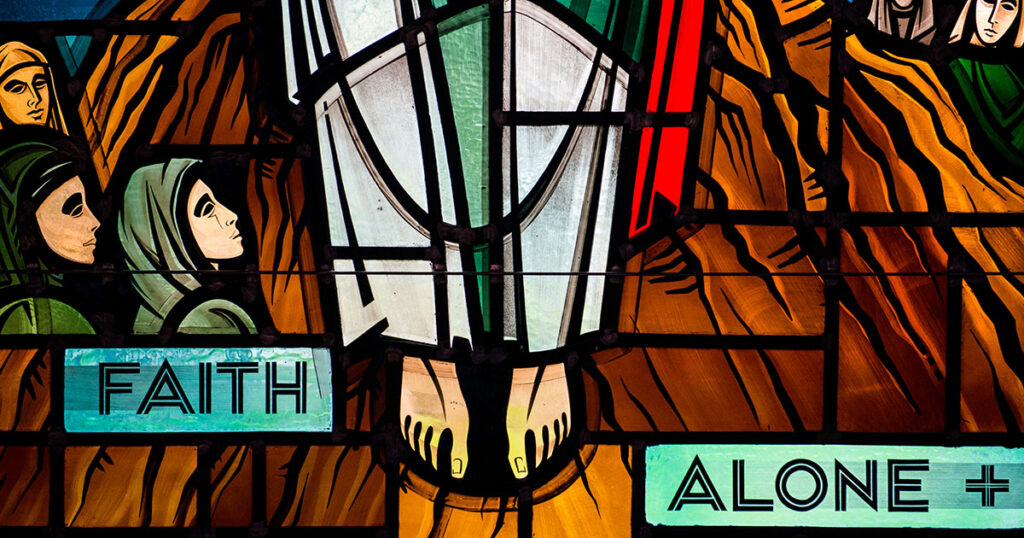God is a God of order, not of chaos. He has placed all of us into families, societies and churches. These are the three orders, sometimes called estates, that define our relationships and duties or vocations to one another.
Each of the orders has offices that require subordination. Everyone, believer or unbeliever, must subordinate himself within these orders. The unbeliever submits out of necessity, to avoid punishment or gain reward. It is entirely different for Christians. We subordinate ourselves to authority in imitation of Christ and in confidence of His goodness. We do this in humility, for the good of the community, knowing that God has placed us together for each other. The new man in us is not interested in power or prestige. Rather, he recognizes that we are not autonomous individuals but are all part of a body.
All but the youngest of children find themselves in positions of authority and subordination simultaneously. In the family, wives owe their husbands respect and the husbands owe their wives their very lives (Eph. 5:22–33). Children owe their parents reverence and obedience, while parents owe their children bodily well-being and instruction (Eph. 6:1–4). Employees owe their employers reverence, obedience and faithfulness. Employers owe their employees respect and fairness. Citizens owe their rulers taxes and customs as the law demands (Matt. 22:21; Rom. 13:5–7). They also owe respect and honor, while rulers owe their citizens justice and protection. All Christians owe their pastors listening, honor and wages. The pastors owe the church tireless service, faithful teaching and prayers provided without charge (see the Table of Duties).
Subordination and the burden of authority
Above all, of course, Christians owe Christ full obedience: fear, love and trust (Mark 12:28–34). Scripture pointedly describes Christians in terms of subordination. We are the children of God, the Bride of Christ and the servants of Christ. But it goes both ways. We are subordinate, but He bears the burden of authority. That authority is itself duty. All that husbands owe their wives, parents owe their children and rulers owe their citizens is given to us by Christ. He bestows on us His salvation, instruction and love, as He obeys His Father.
Of course, fallen humans can abuse one another. We are not Christ and do not fulfill our duties without any failures or selfishness, but the point here is that hierarchy, in and of itself, isn’t evil, nor is it cold or incapable of affection. God is a God of hierarchy and has created the world for order. A parent-child relationship is hierarchical and authoritarian. The child has little to no self-direction, few choices and almost no control of his day. He is subordinate to his mother. He owes her honor and obedience. Yet we expect that it is a completely loving relationship even among fallen human beings. We also recognize that the mother bears the greater part of the burden even if she enjoys more autonomy than the child. In a similar way, being equal isn’t automatically good. Equality can also be oppressive when “equal” peers see one another as a threat to promotion or competition breeds hatred.
In the redemption of Christ, Christians recognize that being subordinate is a natural and good thing. Subordination means living not for ourselves but for others. It is a cross in the duties that are placed upon us and where we fail to live up to it, we sin. Therefore, subordination can accuse us.
At the same time, a mother’s duty to clean up after a child can be performed in kindness, gladly. Sometimes our subordinates are easy to love. Even when our duties are a burden, they are blessings to our subordinates, and we rejoice to be involved and honored by God in these ways. The world can think only of its own pride, personal advantages and power. It does not think in terms of service and authority. But we are redeemed for something more.
For the good of the subordinate
Furthermore, the world places an inordinate value in authority, whereas in God’s eyes, the subordinate person is more valuable than the one in authority. Here is what I mean: God established these orders for the benefit of the subordinate, not of the authority. The one in authority is the servant. Christ did not come to be served, but to serve (Matt. 20:28). He is not like the kings of this world. The apostles are clearly and in every way subordinate to Jesus, but Jesus washes their feet and serves them (John 13:1–20). Children are subordinate to their mothers, but their mothers clean the house and make dinner for them.
A classic cartoon demonstrates how fallen, selfish reason thinks. The cartoon shows aliens from outer space observing human beings walking their dogs and picking up their feces. The aliens assume that dogs are the dominant species and the humans are their slaves. The joke is that humans are acting in a way that is inferior to dogs and is unreasonable. But that is only true if you think in terms of power and cannot imagine why anyone would pick up someone else’s feces unless he was in bondage.
In fact, mothers and fathers and even older siblings clean up children’s feces all the time. They do it not in bondage, but in willful, voluntary, loving service to the child. There is no thought of superiority or power. The child is subordinate, but he is not oppressed or inferior. He is subordinate in order to receive from his mother the gifts of her office. The mother serves the child over whom she exercises authority for his benefit not for hers. Her authority and service are not a means of manipulation or control but are acts of love. These acts in no way debase her or undermine her authority. The child submits to and obeys her in part because of these acts of service that she provides in humility and love for his sake. The child doesn’t exist for the mother, but rather the mother exists for the child.
Subordination in marriage
Husbands and wives are similar to mothers and children in that there is a hierarchy, but the offices are distinct. Wives are not called upon to obey their husbands in the same way that children are to obey their mothers.
A wife’s subordination to her husband’s authority will result in obedience, but, again, subordination does not imply inferiority or subservience. Wives are not inferior or subservient to their husbands. It is possible to be subordinate and also equal. Wives are equal to their husbands as helpmeets, and husbands are incomplete without them. It is not only possible but necessary for godly subordinates to lead and aid those in authority over them with support that includes rebukes and guidance.
In the end, the Christian wife bends her own will to her husband’s not as an act of obedience but of reverence. She bends her will to her husband out of reverence for God who made him her head. She voluntarily submits because God has established this order, not just for her benefit but also for the benefit of her children and the world.
Husbands don’t rule over their wives as tyrants. But as Christ rules His church as a suffering servant, so husbands lead their wives by self-sacrifice and example, teaching, guiding and listening. While the wife’s will might have to bend to her husbands, his body and pleasure are bent to hers. Her needs come first. He doesn’t ask her to make sacrifices for him, though she might, but rather is to be in a constant state of sacrifice for her.
More than a burden
Christian subordination and service, of course, are not possible without the forgiveness of sins. Loving one another, forsaking all others, is an ongoing act of forgiveness that is founded in being forgiven by Christ. Husbands and wives do this, often without much reflection or effort, because they are forgiven in Christ. Mothers care for children out of obvious need because they see Christ in their children. While marriage can be hard because of our sins, it isn’t always hard. It is not pure burden and cross. Sometimes our wives and husbands, our children, our pastors, and our brothers and sisters in Christ are easy to love and to forgive. There can and should be great joy in children and marriage because they are gifts from God. Motherhood is more than changing diapers. It is also snuggles and laughter. Holy Marriage is more than duty and subordination. It is also companionship and joy. Christianity is more than the Ten Commandments. It is also eternal and abundant life. All of it comes in the order God has established for our benefit and joy.
Photo: LCMS Communications/Erik M. Lunsford





Well written and reasoned article, biblically coherent and Christian.
Respectfully, I have a beef with the author about the disproportionate discussion of the mother-child relationship, as if the father-child relationship does not exist or is considerably less significant. Nothing could be further from the truth. (I’m not saying that the author doesn’t know or believe this; I’m simply saying it should have been mentioned more explicitly and more often.) A child needs its father every bit as much as a mother. In our debased culture, even more so is the father needed. Many fathers are not in the home or life of their children, and this is tragic (we see the evidence of societal destruction all around us because of this), and equally tragic is that so few are speaking of the importance of fathers in the home caring for their children in the way God intended.
All that to say, an updated version of this article is needed and should include the mention of father in equal proportion to the number of times the mother-child relationship is mentioned.
Whatever our station in this life, it is our calling and privilege to be God’s instruments.
“Whatever you do, work heartily, as for the Lord and not for men, knowing that from the Lord you will receive the inheritance as your reward. You are serving the Lord Christ.” (Col. 3:23-24 ESV)
Jesus said, “You are the salt of the earth [and] the light of the world.” (Matthew 5:13-14 ESV)
“[Y]ou are a chosen race, a royal priesthood, a holy nation, a people for [God’s] own possession, that you may proclaim the excellencies of him who called you out of darkness into his marvelous light.” (1 Peter 2:9 ESV)
A refreshing article that in the culture of today we have lost the direction that our Heavenly Father has for us.